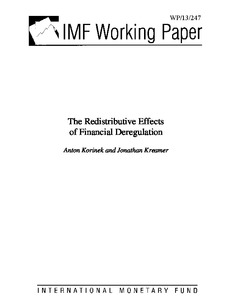The redistributive effects of financial deregulation
"Financial regulation is often framed as a question of economic efficiency. This paper, by contrast, puts the distributive implications of financial regulation center stage. We develop a model in which the financial sector benefits from risk-taking by earning greater expected returns. However,...
| Main Authors: | , |
|---|---|
| Institution: | ETUI-European Trade Union Institute |
| Format: | TEXT |
| Language: | English |
| Published: |
Washington, DC
2013
IMF |
| Subjects: | |
| Online Access: | https://www.labourline.org/KENTIKA-19121401124919496839-The-redistributive-effects-of-.htm |
| Summary: | "Financial regulation is often framed as a question of economic efficiency. This paper, by contrast, puts the distributive implications of financial regulation center stage. We develop a model in which the financial sector benefits from risk-taking by earning greater expected returns. However, risktaking also increases the incidence of large losses that lead to credit crunches and impose negative externalities on the real economy. We describe a Pareto frontier along which different levels of risktaking map into different levels of welfare for the two parties. A regulator has to trade off efficiency in the financial sector, which is aided by deregulation, against efficiency in the real economy, which is aided by tighter regulation and a more stable supply of credit. We also show that financial innovation, asymmetric compensation schemes, concentration in the banking system, and bailout expectations enable or encourage greater risk-taking and allocate greater surplus to the financial sector at the expense of the rest of the economy." |
|---|---|
| Physical Description: | 41 p. Digital |

